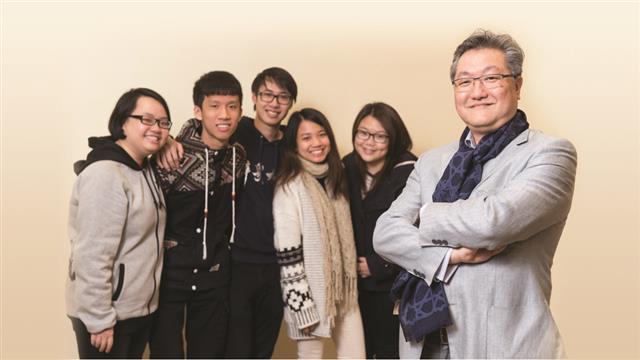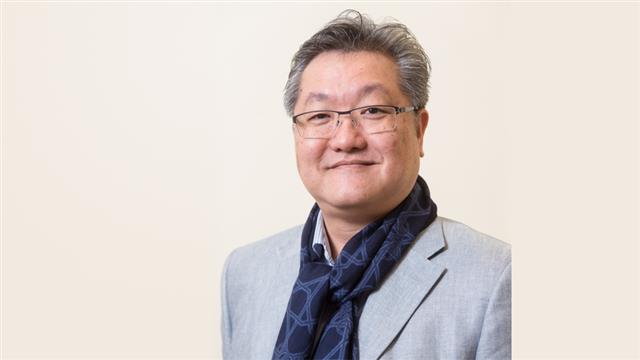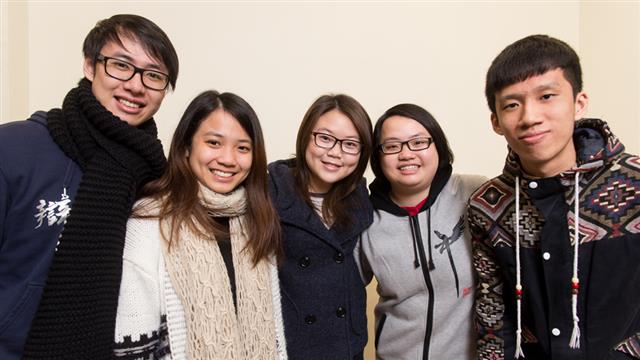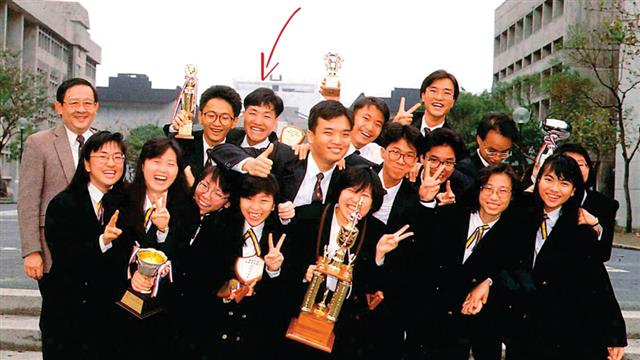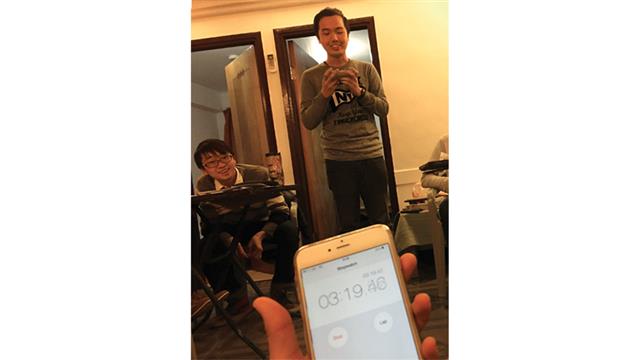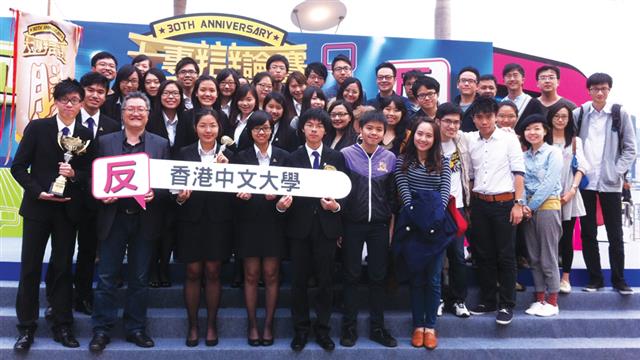When the majority of CUHK students were enjoying the Christmas holidays after their exams, the CUHK Cantonese Debate Team took no rest as they warmed up for the Inter-varsity Debate Competition in March 2015. The team held a training camp in Tong Fuk, Lantau Island. When the classes resumed, training sessions and moot contests are held every week. They are going through the same hardship that makes the CUHK team outdo their counterparts throughout the 31 years of the competition by capturing nine championships—the highest to date, and three victories in a row—the longest winning streak. These outstanding achievements owe themselves not only to their hard work, but the staunch support they have received.
Veterans' Support
Chan Ki-hong Gordon (Year 3, Department of Philosophy), captain of the Cantonese team, pointed out that the CUHK Debate Team has a tradition in which the former members of team lend a hand to the current members. 'These veterans make a special effort to come to the campus after work to help with the training, sometimes till midnight. They also show up at the contests to boost morale.'
To understand more about the tradition, there is no better person to ask than Mr. Alex Shiu, adviser of the CUHK Debate Society and president of CUHK Debate Team Alumni Association. Mr. Shiu joined the team in 1988 and was one of the members who won the Inter-varsity Debate Competition in 1989 and 1990. He was awarded 'Best Speaker' in 1990. He also took the time to edit and compile veterans' speeches, debate materials, the Inter-varsity Debate Competition topics, theories of debate skills into an e-book—Critical Thinking, Judicious Debating—which is updated regularly for team members' reference.
He recalled, 'According to the record of the Office of Student Affairs, the CUHK Debate Team was formally established in 1972. In the early years, team members participated in both Cantonese and English debate contests. Splitting into Cantonese, English and Putonghua teams was a later story. In those years, the competition between tertiary institutions was not as keen as it is now.
'The Inter-varsity Debate Competition was first held in 1984. But the CUHK team walked away without a trophy until 1989. The veterans felt frustrated so they did all they could to make us win. In the meantime, our coach, Dr. Chan Wing-ming of the Department of Chinese Language and Literature, reformed the training to make it more systematic and to ensure that it emphasized logical thinking and analysis from different perspectives. This helped to improve our debating skills significantly. We, on our part, spared no effort. A wonderful “chemical reaction” was triggered. We finally captured the trophy, won our third successive championship, as well as outstanding achievements later on.'
Mr. Shiu emphasized that veterans lending a hand to current members is nothing new. As team members all learn from veterans, it is natural for them to inherit the tradition. But in the early years, the veterans acted on impulse. 'With the establishment of the CUHK Debate Society in 2000, former members were appointed as voluntary advisers. The mechanism of their involvement was thus formalized. For instance, debate teams were selected by a panel of teachers and staff. From then on, veterans were included on the panel, especially those teaching at CUHK or other universities. In the same year, the CUHK Debate Team Alumni Association was established. More veterans with a diverse range of expertise joined thereby deepening the exchange with current team members.'
He said, 'We now have over 200 veterans, just from official records. Their years of graduation range from the late 1980s to the recent years. More than half are very active. The Chinese New Year gathering of the Cantonese team held last year was attended by some 120 veterans and current team members. The large and strong veteran base contributes to the success of the mechanism.' Success is by no means fortuitous. Veterans no longer coach on impulse. The schedule for various activities and training is fixed for easy reference of former members to attend as needed.
Rewarding Experiences
Gordon and his team members, Ng Wing-yan Yanice (Year 1, Chinese Language Education Programme), Cheng Pak-ling Charlotte (Year 3, Food and Nutritional Sciences Programme), Cheung Tsz-man (Year 1, Department of Chinese Language and Literature), and Yim Wai-yee Joanne (Year 2, Department of Chinese Language and Literature) praised the veterans' contribution to the improvement of their debating skills, as well as personal development and way of thinking.
Gordon said, 'These former members come from different walks of life. There are doctors, lawyers, electronic media anchors, government officials, professors…. When I first encountered such a large network, I felt uneasy. But after learning from veterans on collecting data, follow-up research, analyzing, and thinking from multiple perspectives, I now see them as my role models. My goal is to give back to the next generation, The most amazing thing is though veterans have gone through the same training, they are able to turn what they learnt into their unique styles of debating. Some are humourous while others emphasize data or logical analysis. There is a lot to learn in debate; there is also a lot of fun. So pressure is turned into power which motivates me to learn more from them.'
Yanice said, 'The instructions of the old members are very helpful to newcomers like me. They help to widen my vision. We are like family.' Charlotte said that veterans told her to consult them whenever she had questions. She felt embarrassed and scared of bothering them, who were still in school. As they became familiar with each other, she found out that she could ask them anything and they would give a fascinating answer. Perhaps this is a typical trait of champion debaters.
Tsz-man remarked, 'Veterans share what they saw and learnt in their fields, and remind us of what mistakes to avoid. I had the most valuable “life lessons”.' Joanne agreed, 'I speak very fast with no break. Sometimes the structure of my speech is incomplete, making it hard to comprehend. I was never aware of it. But veterans pointed out my weakness instantly in the debate training camp. I am trying hard to correct it and hope to do a great job in the coming training session and win their approval.'
After listening to current members talk about what they have gained, Mr. Shiu who has gone through the process, said, 'They are just like me in those days. I was once the beneficiary, so giving back is natural.' Twenty-five years has passed since Mr. Shiu graduated from CUHK. While people and things keep on changing, the pass-it-on tradition of the debate team never changes.


